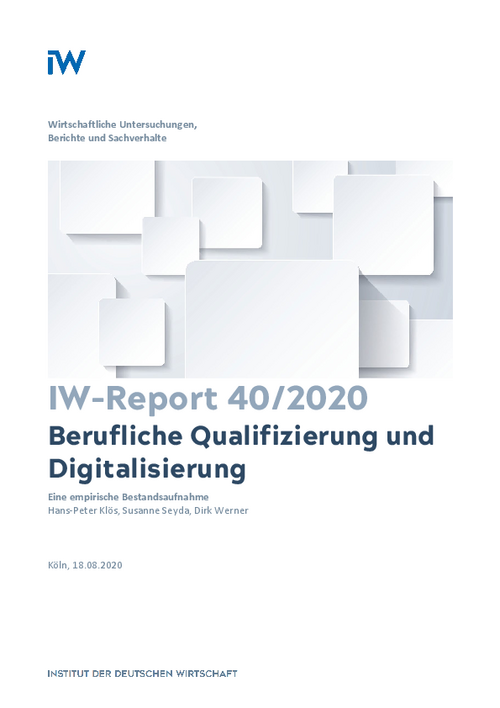The current economic difficulties for numerous companies are likely to further intensify the structural trend of digitization. Especially in times of crisis, companies will decide on their use of the technical possibilities.

Professional Qualification and Digitization
IW-Report

The current economic difficulties for numerous companies are likely to further intensify the structural trend of digitization. Especially in times of crisis, companies will decide on their use of the technical possibilities.
New digital technologies lead to more online-based and platformbased business models and will continue to change work processes. The use and further development of new technologies place new and changed demands on employees. Many professional tasks will become more complex, more demanding and thus tend to be of higher quality. This also places increased demands on professional qualifications in both initial vocational and further training.
This paper systematizes some of the findings on the connection between vocational education and training and digitization. The corona crisis is proving to be an accelerator of the structural change to digital teaching-learning formats. Training companies have a higher degree of digitization than non-training companies. The higher the degree of digitization of a company, the more likely it is that employees will take part in further training and the more time and money companies will spend on further training. The higher the degree of digitization of a company, the more digital media are used in training and further education. The requirements of digitization are not only in the area of IT knowledge, but also encompass a wide range of skills.
The companies see a great added value of the digital learning offers in the fact that they can be easily integrated into everyday work. In addition, they consider the combination of digital learning media with attendance phases in the context of blended learning to be advantageous. However, digital learning media do not automatically lead to better and more sustainable learning outcomes than conventional methods. The prerequisite for this is that trainers and advanced trainers have the necessary media didactic tools. The didactic advantages of digital media have not yet been sufficiently recognized. Digital learning opportunities should therefore be tailored to specific target groups so that all population groups can benefit from them. This also means that there should also be modules with which self-directed learning can be learned.

Hans-Peter Klös / Susanne Seyda / Dirk Werner: Berufliche Qualifizierung und Digitalisierung Eine empirische Bestandsaufnahme
IW-Report

More on the topic

Further training needs of the automotive industry in transformation
Due to the ecological and digital transformation, significant parts of the German economy, particularly the industrial sector, are currently undergoing a transformation. This development also extends to the automotive sector, which occupies a vital position in ...
IW
The Increasing Importance of Literacy Courses and Further Training for the Low-skilled
Digitalisation and the demographic transition are presenting companies with ever new challenges. This puts pressure on firms to be in a process of constant change, a phenomenon reflected in the growing demands they put on their low-skilled employees.
IW